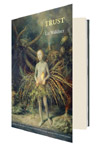You can get lost in Liz Waldner’s poems: lost in the best ways—enchanted, ecstatic, caught up in a high-speed verbal world—but also lost in ways that cause distress. If you aren’t used to her excitements, to her volatile forms, you may find, at first, little else but confusion therein: “Such embroidery of the green / Body. The sky / Is a beautiful wound / In it. I / Would like this not to be / True but it is.” So her seventh book begins. It’s a tree (the poem is called “Truth, Beauty, Tree”), but it’s also a space that the soul, seeking its own companions, opens up within the material world, whose pleasures never leave us satisfied. Any part of any body, any spare thing (animal, vegetable, mineral), may give Waldner a spiritual emblem; “the ant… is three beads / Strung on an impetus that means ‘Everything is necessary.’” Her title asks how to accept such symbols, such meanings, and whether and when to believe them. Waldner’s verse, with its rapid changes of subject, its overlapping figures, and its raw edges, pays constant homage to the delights of the senses; beside her, most similarly difficult present-day poets seem arid, theoretical, no fun.
Older poets, on the other hand, are grist for her mill. Her irreverent sensibility lets her rewrite the end of the Iliad: “Great the citadel’s taken (second-story party) / But everybody’s dragged shit-faced in the dust behind horses— / And here’s Helen, moved to Iowa, eating candy corn.” More often she rewrites the Christian liturgy, or reshapes incidents in the Bible. “Amen (On Christmas Day)” turns its focus from Christ to Mary (“the birth, the afterbirth, the maiden, the wench, / the blood on the sawdust, the warm stench”); Waldner entitles the next poem, even more irreverently, “Miracle Whip, or Every Angel His Own B(r)e(a)dspread.”
Waldner makes promises, expresses devotion, but she also takes her own commitments apart: she represents both the core of the self, that which wants (the id, to Freudians), and the self-conscious, too-knowing part that monitors and investigates that core (the intellect, if you like, or the superego). The intellect, heard by the id, sounds too sophisticated, hard to understand, and Waldner represents it by a flurry of allusions and twelve-dollar words. The id, heard by the intellect, sounds childlike, scary, exciting, almost inarticulate, and so Waldner represents it, deftly, by something like baby talk:...
You have reached your article limit
Sign up for a digital subscription and continue reading all new issues, plus our entire archives, for just $1.50/month.
Already a subscriber? Sign in





